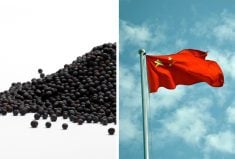A global shortage of vitamins A and E for livestock use is forcing feed manufacturers to revise formulations.
The Canadian Food Inspection Agency said today that the shortage was caused by an Oct. 31 fire at the BASF plant in Ludwigshafen, Germany. Supplies are expected to remain below optimum levels well into the first quarter of 2018, it said.
“As a result, feed manufacturers are revising their feed formulations with reduced levels of these vitamins in order to continue to provide feed to livestock. The temporary reformulation of feeds to reduce levels of vitamins A and E is not expected to cause any undue safety or welfare risks to livestock,” the CFIA said.
Read Also

Canada and China discuss disputes over canola and EVs, says Ottawa
Senior Canadian and Chinese officials discussed bilateral trade disputes involving canola and electric vehicles on Friday, Ottawa said, but gave no indication of any immediate breakthrough.
The agency has developed “interim guidance” for feed manufacturers that are required to provide certain nutritional guarantees in their feeds.
If they plan to reduce levels of A and E vitamins, they must provide the CFIA with notice of reformulation and attest that labels reflect nutrient guarantees.
“The guarantees for these vitamins will return to the levels as approved in their registrations when the supply of vitamins A and E has stabilized,” the CFIA said.














